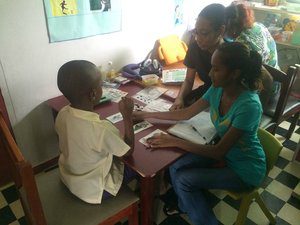In Guyana, when the common person hears the term autism or Autism Spectrum Disorder (ASD) then they are almost immediately puzzled as to what the disease really is or whom it affects. This is so because, as a Guyanese society, we are hesitant to broach the conversation on a commonly misdiagnosed or undiagnosed disorder that affects so many people around us.
The fact remains that the Public Health Ministry, and by extension Government, is doing a poor job at educating the populace about ASD and the only time the conversation begins about the disorder is in April for World Autism Month and it dies on April 30.
Autism Spectrum Disorders (ASDs) are intricate neurological disorders often categorized by challenges with social skills, repetitive behaviours and general communication abilities. However, persons suffering from ASD are more than likely to be on the higher academic scales but suffer tremendously as it relates to their social skills and those on the opposite end of the academic field cannot access education since they cannot speak or even concentrate.
While the causes of the disease have not been isolated, it is widely believed that it stems from a series of genetic and environmental influences. Contrary to the popular myth, there are conclusive data that proves ASD is not remotely related to measles, mumps and rubella vaccines during the early childhood rather the data went as far to determine that vaccinations, as

a whole, does not increase the risk of ASD.
Autism, according to the World Health Organization, affects 1 in every 160 children worldwide but sadly for Guyana there are no comparative statistics since autism is only highlighted during the month of April or whenever a Non-Governmental Organization hosts a programme that seeks to bring about awareness.
Statistics
However, using the WHO figure of 1:160 and comparing it to the approximate 773,000 residents in Guyana it would equate to approximately 4,800 persons suffering from ASD. Due to the lack of skilled doctors/pediatricians in Guyana, ASD in quite often misdiagnosed or not diagnosed at all.
The WHO says individuals with ASD often present other co-occurring conditions, including epilepsy, depression, anxiety and attention deficit hyperactivity disorder (ADHD). The level of intellectual functioning in individuals with ASDs is extremely variable, extending from profound impairment to superior levels. Nevertheless, there are some telltale signs that can lead to early detection of ASD in children since they start appearing as early as six months old.
Advocates urge parents to observe their child’s behavioral patterns and looks for signs such as lack of eye contact, social isolation, delayed language development, struggles identifying social cues, constant repetition of same words or phrases, unusual reactions to taste, sound or smells and gets intensely upset by minor changes to their routine or surroundings. Experts have related that the aforementioned signs should be taken seriously and immediate intervention should be pursued.
Once identified, then it is advised that families seek the relevant information and have services offered to help them address the individual needs of their child. But in Guyana accessing services primarily for ASD victims is one that is not readily available since government institutions offer very limited services and the NGOs are limited in what they can do since most of them depend on funding from donors and in most cases those funding and grants are often minimal.
Care
Nevertheless, to access information and services to care for an autistic person one can visit the Step By Step Foundation, the Ptolemy Reid Rehabilitation Centre or the Sorsha Williams Foundation since those entities are equipped to offer advice and specialized care.
Additionally, one thing the organizations promote is acceptance of autistic persons since there is the stigma attached to persons who not considered “normal” in the traditional sense. More than necessary, persons with ASD often have to endure the abuse at home from siblings who are tired of them getting all the attention and that is coupled with the deprivation of health, education and social opportunities.
Persons suffering from ASD are heavily dependent on their primary care provider. There are a range or care options and skills training programmes for parents and other caregivers. The most effective is Applied Behavioral Analysis (ABA), which teaches young people, with autism, the life skills they need and how to tap into their true potential.
Additionally, depending on their needs children who have autism receive a range of therapies which included behavior therapy, speech-language therapy, occupational therapy, social skills training and sometimes feeding therapy. However, the training and therapy is not limited to the children rather it incorporates the parents or caregivers since they are the ones who have to understand the person with ASD.
In the Guyana context, more needs to be done to raise awareness on something that is so common but yet least understood.
Remember that autist people can do anything a “normal” person could and in most cases, they can do it better. Take an example from singer Susan Boyle; Naturalist, Geologist, Biologist, Charles Darwin; Mathematician and Scientist, Albert Einstein; Mathematician, Astronomer, Physicist Sir Isaac Newton and Pokémon creator Satoshi Tajiri among a whole host of others. (Lakhram Bhagirat) (Guyana Times Sunday Magazine)



